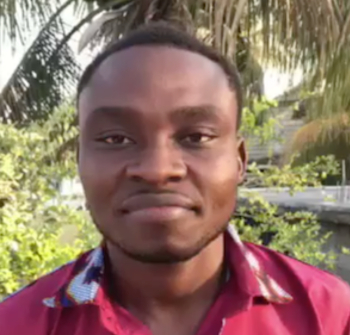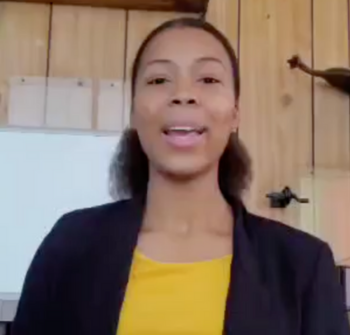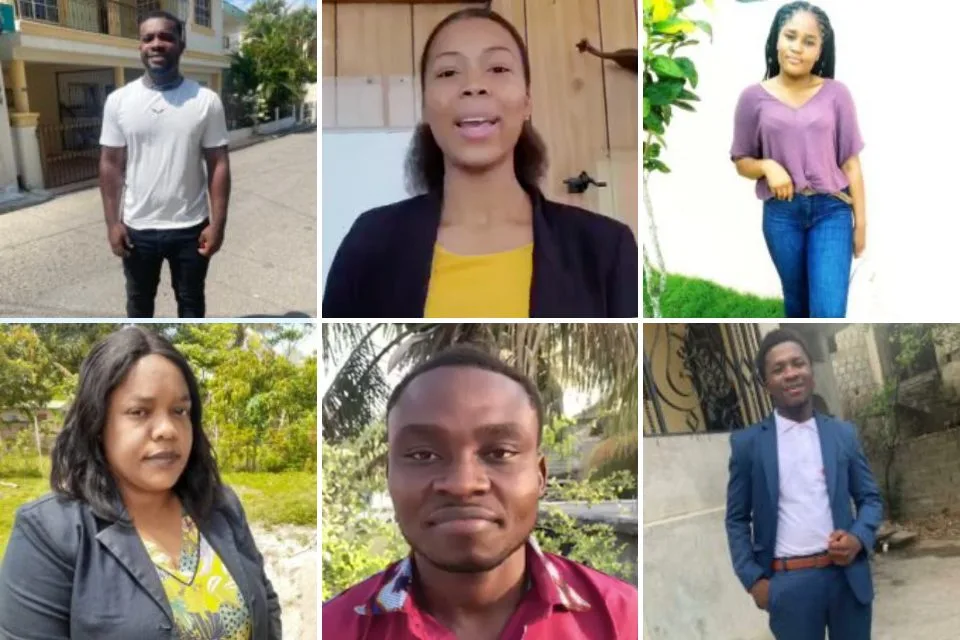Churches can welcome Haitian young adults looking for refuge and opportunities by sponsoring their resettlement through Church World Service’s expanded programming.
JAMES DEATON
Content Editor
Marcia Etu loves leading mission teams; this summer’s trip to Philadelphia will be her eighth. But welcoming an Afghan refugee family into her community by helping them get resettled has changed her life more than any of those mission trips she’s led.
“As much as I love going on mission trips,” Marcia says, “and you come back with that double blessing of having been able to help in some way, embracing this Afghan family has been—by far—the best mission experience I’ve ever had. It’s really amazing.”
By sponsoring an Afghan family’s resettlement through Church World Service’s Community Sponsorship Program, Marcia’s church—Burnt Factory United Methodist Church in Stephenson, VA—is bringing migration ministry to life for their congregation. Marcia and a team of church volunteers have walked alongside this family, who had fled persecution from the Taliban, and are assisting them as they build a life of freedom and hope here in the United States.

Church World Service (CWS) invites Michigan United Methodist churches to join Burnt Factory in the transformative experience that can come through CWS’s ever-expanding resettlement programming. Due to recent changes in federal immigration policies, Michigan churches can now sponsor humanitarian parolees from Cuba, Haiti, Nicaragua, Ukraine, and Venezuela, where other vulnerable populations seek safety and refuge.
Churches in the Michigan Conference have the unique opportunity to welcome Haitians through one of our long-term EngageMI ministry partners, Haitian Assets for Peace International (HAPI). CWS will shepherd churches through the resettlement process step-by-step as HAPI staff match churches with young adults in Haiti whom they’ve identified as promising leaders with skills to succeed in the United States.
HAPI has been empowering rural communities in Haiti since 2007, promoting health and wellness, especially for women, and delivering skilled training. Their HAPITech program is a vocational school that educates young people by teaching them skills that equip them professionally, such as learning English as a second language and repairing computers.
HAPI is located in Mizak, a village about three hours from Haiti’s capital, Port-au-Prince, which has grown in recent years to become a community of internally displaced persons (IDPs), particularly young people, as they’ve fled ongoing gang activity in urban areas. The United Nations recently called for international support to aid Haitian police in quelling violence.
Mario Damis, HAPITech’s coordinator, understands the difficult bind young Haitians face now. Port-au-Prince was a different place when he went to college there a few years ago. But escalating violence and kidnappings by criminal gangs, compounded by a string of natural disasters, have forced many young people out of the city to find safety in rural areas.
Many young adults live in the Mizak area (approximately 65% of the population is under 25), and HAPI is working hard to ensure a different future for local community opportunities (read about their expanding Heart Health initiative here). But the current violent situation is not improving, and these young adults feel isolated and unsure of their future.
“Things are getting worse while they are waiting for things to get better,” says Mario. With so much budding potential, these bright young adults feel like their futures are perpetually delayed. “Many young Haitians,” he explains further, “have dreams, they have projects, but the fact is there are no opportunities here until we have security in the country. They wait, and then their dreams are killed.”
Sponsoring young Haitians to come to the United States as temporary humanitarian parolees through CWS’s sponsorship program is one way Michigan United Methodist churches can do something about this crisis and help turn things around.
Valerie Mossman-Celestin, a United Methodist deaconess and HAPI’s executive director, says that nothing touches her more than seeing personal growth in those connected with HAPI’s ministries and watching them strive and achieve their God-given potential.

“Young people in Haiti who are not in gangs are tired of the system of corruption and truly want change,” says Valerie. “I believe these young adults will be our best ‘ambassadors.’ They will establish themselves and contribute back to their families and communities in a way that changes the face of that community with a far greater impact than what HAPI can achieve alone.”
She continues, “In the United States, they will learn valuable skills and experience a culture that, while imperfect, still works against corruption and believes in opportunity for all. How do you change culture unless young people experience and observe an alternative? How do you cultivate new ideas if you haven’t been exposed to new experiences?”
Mario agrees with the powerful impact of education and giving young people a positive environment to grow and pursue their dreams. He’s experienced it in his own life. Currently, he’s working in Mizak for HAPI. With his income, he can support his large family financially. He has seven siblings, and his family survives by farming the land.
He says, “I’m able to support my family. I’m able to support the community. I’m able to support myself. And I was recently accepted by Ferris State University in Michigan, where I’m going to start a master’s degree this fall in information security.”
Mario will continue working as he can, sending money back to his family in Mizak. That’s one of the gifts humanitarian parolees and refugees receive when they come to the United States. Sponsoring one person will, in turn, multiply and give many more people a better life.
CWS is a veteran ecumenical partner of The United Methodist Church and is one of the nine approved refugee resettlement agencies in the United States. The United Methodist Committee on Relief (UMCOR) was instrumental in CWS’s founding following World War II.
Katie Randall is the staff coordinator from CWS headquarters that Michigan churches will work closely with as they explore the process for sponsoring parolees from Haiti or one of the other countries available through their expanded programming (Cuba, Nicaragua, Ukraine, Venezuela). Once a church agrees to move forward, they will have remote support and technical assistance from CWS for 90 to 180 days following the beneficiary’s arrival in the United States.
Katie loves working with churches and believes they create beautiful spaces for resettlement. Churches have this inherent infrastructure for welcoming newcomers and neighbors. They are already connected to local networks and can get people resources, they are usually good at solving problems, and they have a lot of untapped skills and knowledge in the pews.

“Resettlement sponsorship happens best in groups,” says Katie, “and we really love when churches can utilize all their built-in structures for sponsorship efforts. You don’t have to have just one person doing all the planning and work. Churches have committees with volunteers.”
It’s important for churches to put together a group of people with diverse gifts committed for the long haul. Sponsoring refugees certainly takes a financial commitment, especially early on when it may take a few months for parolees to get authorization to work, but ensuring there are plenty of volunteers assisting with various tasks is the real key to success.
And United Methodist churches know how to mobilize for mission, as Marcia Etu has discovered over the past year as her church came together to sponsor their refugee Afghan family.
As a retired nurse practitioner, Marcia handled the medical, dental, and social service bits. Her husband aided with transportation, teaching the Afghan family members how to use the public bus system. A lawyer helped with the immigration piece. A teacher assisted with getting the family’s kids into school and English classes. Another person assisted with community orientation, showing them the library and the various parks and recreation opportunities. A team of women from the church stocked their kitchen with dishes and food before their arrival.
When building a resettlement strategy, churches must evaluate their community to determine its strengths and weaknesses and what services are readily available. This is another determinant of success. For example, do schools have English as a second language programs? What employment services are there? Where will they live, and how much is rent right now?
Katie Randall notes that asking these questions does not disqualify a church from sponsoring someone. She explains, “It’s just meant to help groups think through things. For example, if we don’t really have public transit, what do we do? What plans do we need to put in place to make sure families have transportation?”
Sponsorship is a great opportunity for churches to think creatively and partner with other churches or individuals to fill in expertise gaps on the team. If a church doesn’t believe they can raise enough money to support the parolee, they may ask another church in their community to join them. Maybe there are no members currently involved in health care, but someone’s sister is a doctor, or the child of a church member is a nurse. Sponsorship is a way for a congregation to go beyond its walls, reaching out with God’s love and care to others.
Marcia Etu and Burnt Factory UMC have learned so much due to their sponsorship, and their relationships with their new neighbors have been gifts from God.

“Our goal in sponsoring this Afghan family was to help them get on their feet, but ultimately, that we would be friends and not sponsors. And so, the exciting part is that’s where we are now. We were their sponsors, but we will always love and care for them.”
Marcia admits there have been challenges and times when she gets really tired, but it has been so rewarding to step outside of her comfort zone and be involved with this program.
It’s been a blessing to see the joy on the faces of the Afghan family members when they learned to trust her. It’s been a blessing to have the family teach them about Afghan culture and food, and their Muslim faith. It has been a blessing seeing the family grow and become self-sufficient. The father has a good job, successfully obtained his driver’s license, and can now send money to their older children in Afghanistan. And they are moving along on the path to U.S. citizenship, thanks to CWS’s assistance and a team member who is an attorney.
Michigan United Methodist churches have an excellent opportunity to experience similar blessings as they consider sponsoring humanitarian parolees through CWS’s program.
Does this kind of mission and ministry tug at your heart? Do you want to learn more about the process? Then, click the button below to access CWS’s online interest form. Complete it, and CWS staff will be in touch with you to explore sponsorship.
Did Mario’s story inspire you? Would you like to hear more stories from Haitian young adults ready to come to the United States to become vital members of our communities? Click the button below to listen to some amazing stories of Haitians preparing for sponsorship and how they would love churches in Michigan to help them make their dreams take flight.
Last Updated on May 16, 2023



